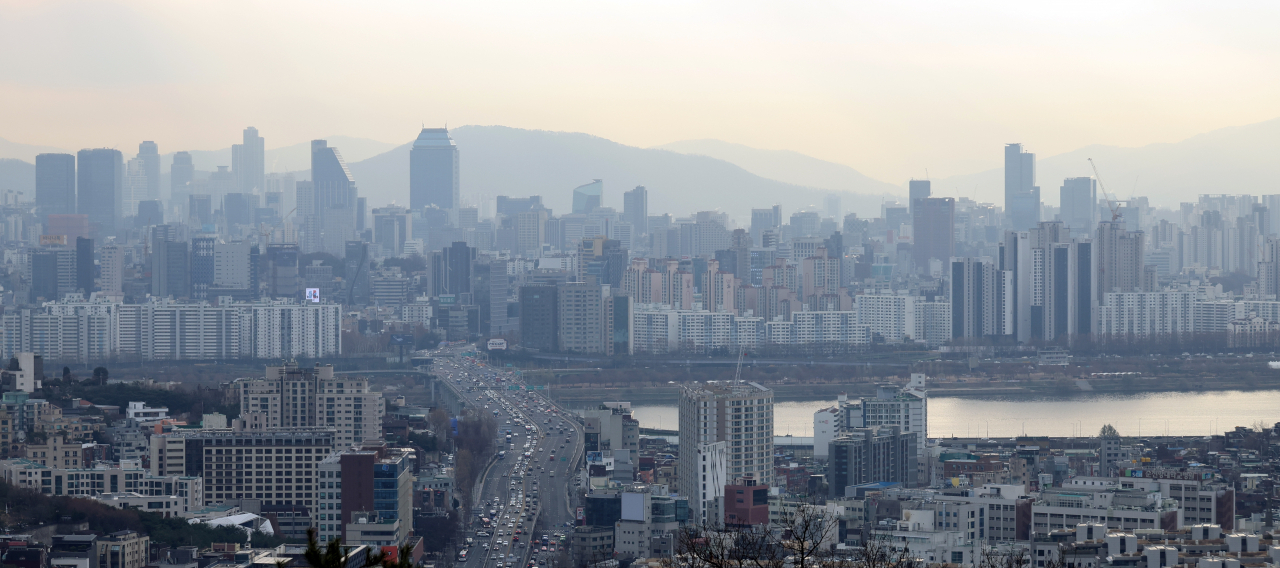Seoul City scraps building height limit after 9 years
By Son Ji-hyoungPublished : Jan. 5, 2023 - 14:41

The city government of Seoul opened the doors to a more dynamic skyline in South Korea's capital city on Thursday by scrapping the apartment building height limit, a move that could prop up Seoul's chilly housing market.
The 2040 Seoul Plan confirmed Thursday will immediately put an end to the floor limit for new residential buildings across Seoul, introduced in 2013 by since-deceased former Seoul Mayor Park Won-soon, according to the Seoul Metropolitan Government.
Seoul has prohibited any plans to build apartments higher than 35 floors -- regardless of the elevation -- for the past nine years.
The new blueprint is poised to foster a more flexible and creative urban landscape, a Seoul City official said. Regulations to restrict urban density, meanwhile, will remain in place to ensure openness of space in the country's most populous city.
The move is meant to "transition its urban planning toward flexibility by reflecting a drastic shift in environment," said Cho Nam-jun, director general of the urban planning bureau at Seoul Metropolitan Government.
"We expect this basic urban planning to serve as a blueprint for the subordinate plans to improve Seoulites' quality of life and sharpen Seoul's competitive edge."
The shift comes as part of a deregulative urban plan that Seoul began working on in 2019. Seoul Mayor Oh Se-hoon unveiled the tentative plan last year in March, and legal procedures were complete in November.
Also under the plan, Seoul pledged to expand flexible zoning to allow more areas in Seoul to serve multiple purposes of the land use to promote urban diversity. The new urban design will also allow Seoul residents to have greater access to business and entertainment options from home, all "within 30 minutes of walking distance."
The new urban planning is likely to prompt redevelopment of older neighborhoods in Seoul.
Currently among Seoul's designated areas for redevelopment are lucrative neighborhoods -- including Apgujeong and Cheongdam in Gangnam-gu, Jamsil in Songpa-gu, Yeouido in Yeongdeungpo-gu, Mokdong in Yangcheon-gu and Seongsu in Seongdong-gu.
Such "urban renewal acceleration districts" can execute housing renewal initiatives and supply more housing.
This came amid fears of a marked economic slowdown with regulatory hurdles in the housing market standing in the way. President Yoon Suk Yeol told the Land Ministry in a meeting Tuesday that "the interest rate hike is increasing the chances of a hard landing (of the real estate market), so the regulations on the demand side must be eased in a swift manner."
Seoul experienced an overheated housing market until monetary easing in the wake of the COVID-19 outbreak gave way to inflation and fast-paced interest rate hikes in 2022.
According to data compiled by the Korea Real Estate Board, Seoul apartment prices have been falling for 32 straight weeks until Thursday, seeing a 0.76 percent drop solely in the last week of December at the sharpest. A separate set of data from the Seoul city government showed housing transactions in 2022 shrank to a fourth of that in 2021.
All eyes are on whether more follow-up measures will be taken to slow the downtrend in the housing market, such as a possible decision by Seoul to lift regulations that required those who transact more than 6 square meters of land to gain local government authorities' approval.
Seoul has so far designated parts of Gangnam-gu, Songpa-gu and Seocho-gu as well as Yangcheon-gu, Yeongdeungpo-gu and Seongdong-gu as "land transaction permission zones" to restrict such deals.
Meanwhile, deregulation in homebuyers' loans across Seoul by the central government came into effect Thursday, barring lucrative neighborhoods of Seocho-gu, Gangnam-gu, Songpa-gu and Yongsan-gu.







![[Graphic News] More Koreans say they plan long-distance trips this year](http://res.heraldm.com/phpwas/restmb_idxmake.php?idx=644&simg=/content/image/2024/04/17/20240417050828_0.gif&u=)
![[KH Explains] Hyundai's full hybrid edge to pay off amid slow transition to pure EVs](http://res.heraldm.com/phpwas/restmb_idxmake.php?idx=644&simg=/content/image/2024/04/18/20240418050645_0.jpg&u=20240419100350)






![[From the Scene] Monks, Buddhists hail return of remains of Buddhas](http://res.heraldm.com/phpwas/restmb_idxmake.php?idx=652&simg=/content/image/2024/04/19/20240419050617_0.jpg&u=20240419175937)

![[KH Explains] Hyundai's full hybrid edge to pay off amid slow transition to pure EVs](http://res.heraldm.com/phpwas/restmb_idxmake.php?idx=652&simg=/content/image/2024/04/18/20240418050645_0.jpg&u=20240419100350)

![[Today’s K-pop] Illit drops debut single remix](http://res.heraldm.com/phpwas/restmb_idxmake.php?idx=642&simg=/content/image/2024/04/19/20240419050612_0.jpg&u=)